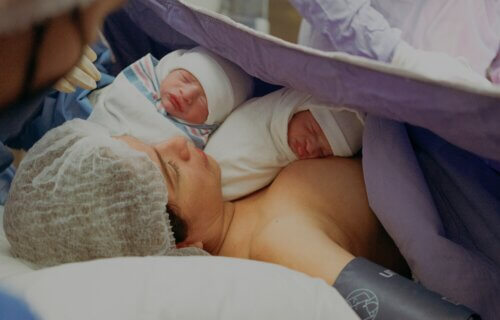BERLIN, Germany — The idea that mothers of twins are more fertile is a myth, according to new research. An international team of scientists adds having two babies at a time provides an evolutionary benefit, helping older women have bigger families from fewer pregnancies.
The findings are based on more than 100,000 births from pre-industrial Europe – one of the biggest studies of its kind. It found mothers more likely to have twins actually gave birth less often – a result that contradicts previous findings.
These women are not unusually fruitful. The international team dubbed it the “lottery ticket effect.” They declared: “mothers of twins are not more fertile, just lucky.” The researchers add that previous science mixed up cause and effect.
“If a mother gives birth more often, it is more likely that one of these births is to twins – just like you are more likely to win if you buy more lottery tickets, or to be in a car accident if you drive a lot,” explains first author Dr. Ian Rickard of Durham University in a media release.
Did evolution create a pregnancy paradox?
In humans, twinning occurs in up to three percent of all births, despite a much higher risk of complications for both the mother and her children. The prevailing theory is natural selection has prevented it from becoming more common. However, evolution has not wiped it out altogether, creating a paradox.
One common explanation is women who are more fertile than average are also more likely to release more than one egg when they ovulate. Many earlier studies analyzed demographic data and obtained results consistent with this view, but the latest demonstrates they were flawed.
“Previous studies are problematic because they cannot tell us whether mothers with twins give birth more often because they are especially fertile, or because giving birth more often increases the chance that one of these births is to twins,” says principal investigator Dr. Alexandre Courtiol from the Leibniz Institute for Zoo and Wildlife Research in Germany.
By combining large historical datasets of birth outcomes from today’s Finland, Sweden, Norway, Germany, and Switzerland, the researchers found mothers of twins are not unusually fertile.
“All these data originate from old parish records that have been meticulously digitized and transcribed,” adds co-author Professor Virpi Lummaa from the University of Turku.
While twinning can run in families, previous studies have suggested environmental factors are more important. They include greater health in the mother or childbearing at later ages, which are more likely to produce twins.
“To avoid the statistical trap that plagued former studies, we also had to deploy efficient and carefully calibrated statistical procedures,” says co-author Dr. François Rousset from the University of Montpellier in France.
Why does twinning still happen?
The study, published in Nature Communications, has implications for public health as well as providing academic interest. Biomedical studies looking for ways to improve female fertility have compared mothers with and without twins.
“Such study designs ignore the multitude of factors influencing how often a woman gives birth, which will mask any genuine differences in physiology between mothers with and without twins,” notes co-author Dr. Erik Postma from the University of Exeter.
Comparing groups of mothers with and without twins may hide the effects of fertility genes where they exist or create the illusion of these if they do not exist.
“There is still much we do not understand about twinning, but our study suggests that twinning has not been eliminated by natural selection for two reasons,” Dr. Courtiol concludes.
“First, twinning is a consequence of double ovulation, which compensates for reproductive ageing and benefits all but the youngest of mothers. Second, when the risk of early mortality of twins is not too high, twinning is associated with larger family sizes although women with twins give birth less often. This is because twin births bring two offspring rather than one.”
South West News Service writer Mark Waghorn contributed to this report.

